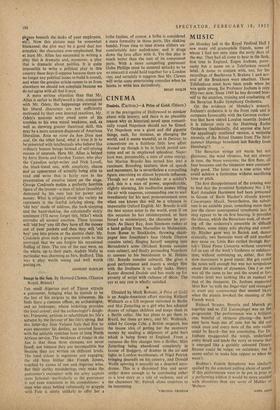CINEMA
Desiree. (Carlton.)—A Prize of Cold. (Odeon.)
IT Is the prerogative of Hollywood to monkey about with history, and there is no plausible reason why an historical novel spun romanti- cally round Napoleon should not he filmed. Yet Napoleon was a giant and did gigantic things, such, for instance, as changing the world, and it seems wasteful, as in Desiree, to concentrate on a fictitious little love affair dressed up though it be in lavish period cos- tume and set in unrelieved splendour. Napo- leon was, presumably, a man of some energy, but Marlon Brando has turned him into a ruminant. Brooding, taciturn, slow of speech and movement, he is nevertheless a compelling figure, exercising an almost hypnotic influence. Though not an empire builder or a soldier's god, this is a man of power, unpredictable, slightly alarming, his meditative pauses filling the air with suspense, commanding one to wait breathlessly for his next pronouncement even when one knows this will be a triteness in impeccable Oxford English. Mr. Brando is still the best screen actor in the world, even if on this occasion he has misinterpreted, or been forced to misinterpret, the character he por- trays. As Daisy Ray, Jean Simmons rushes at a hand gallop from Marseilles to Malmaison, from Rome to Stockholm, throwing cham- pagne into Josephine's face (Merle Oberon remains calm), flinging herself weeping into Bernadotte's arms (Michael Rennie remains even calmer), and finally persuading Napoleon to consent to his banishment to St. Helena (Mr. Brando remains calmest). She gives a good performance and injects a stodgy film with the liveliness it so sadly lacks. Henry Koster directed Desiree and has made up for poverty of script with richness of decor. The eye at any rate is wholly satisfied.
VIRGINIA GRAHAM










































 Previous page
Previous page